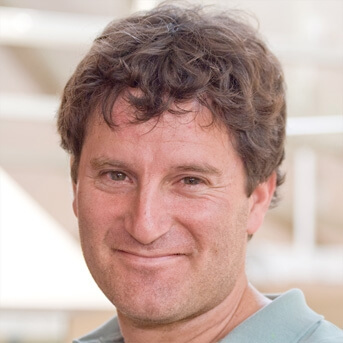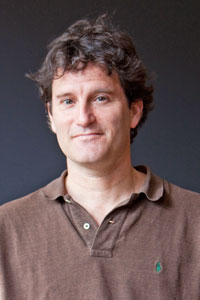News
Applied mathematician Michael Brenner, "a constant positive force for quantitative thinking," was awarded the George Ledlie Prize by the President and Fellows of Harvard College.
Cambridge, Mass. – February 28, 2011 — Michael Brenner, Glover Professor of Applied Mathematics and Applied Physics at the Harvard School of Engineering and Applied Sciences (SEAS), has been awarded the George Ledlie Prize by the President and Fellows of Harvard College.
Brenner, who received his Ph.D. in physics from the University of Chicago in 1994 and came to Harvard in 2001 after six years as a faculty member in applied mathematics at MIT, was praised for his creative research and his dedication to teaching and learning.
“He is richly deserving of this award, not only for his stellar research on the application of mathematics to a wide range of problems in science and engineering, but also for the equally compelling way he infuses his love for the subject to his work as a remarkable teacher and mentor,” said Venkatesh “Venky” Narayanamurti, Benjamin Peirce Professor of Technology and Public Policy at SEAS and Director of the Science, Technology, and Public Policy Program at the Harvard Kennedy School.
Over the last 10 years, Brenner’s research has focused primarily on theoretical modeling in physical sciences and engineering. Problems he has tackled include the breaking of fluid droplets, sonoluminescence (the production of light from very high-pressure gas bubbles in liquid), the sedimentation of small particles, and electrospinning (a materials technique for producing small fibers).
Recently, Brenner has branched into an even broader spectrum of fields, from atmospheric chemistry (developing algorithms to accelerate simulations of global pollution) to materials science (understanding the limitations of self assembly and pattern formation) and physiology (exploring voltage-gated ion channels and hemoglobin). With support from the Kavli Institute for Bionano Science and Technology at Harvard, he has also explored how to limit the growth of biofilms and even used “simple math” to explain dramatic beak shape variation in Darwin’s finches.
Brenner has been lauded for his teaching and mentorship several times before. He was named a Harvard College Professor in 2010 and in 2009 was given the inaugural Capers and Marion McDonald Award for Excellence in Mentoring and Advising at SEAS. He has been particularly instrumental in exposing undergraduates to the joys of applied mathematics through the course Applied Mathematics 50, in which he invites students to use unorthodox problems—such as the reproductive dilemma of humble fungi—as material for quantitative investigation.
Grace Tiao ’08, in a profile of Brenner, wrote: “His lectures, in fact, resemble in pace and execution the projectile motion of flying spores. When he speaks about his favorite subject—interdisciplinary approaches to problem solving—his sentences pop and plunge. Brenner has a habit of stopping mid-predicate to allow the next thought to hurtle into the air.”
He was also a driving force behind the wildly popular “Science and Cooking” general education course at Harvard College, which he co-taught this year with SEAS colleague David Weitz, Mallinckrodt Professor of Physics and of Applied Physics, and a team of world renowned chefs, instructors, and teaching fellows.
“Michael has been a constant positive force for quantitative thinking—not simply limited to particular classes, but infused throughout the College curriculum,” says SEAS Dean Cherry A. Murray, John A. and Elizabeth S. Armstrong Professor of Engineering and Applied Sciences and Professor of Physics. “His ultimate goal is nothing less than repositioning applied mathematics as a way of thinking and transforming the concentration into a quantitative liberal arts degree. He makes applied mathematics inviting, engaging, and, for lack of a better word, hip.”
As Area Dean for Applied Mathematics at SEAS, he is working with Murray to radically overhaul and enhance the undergraduate and graduate curricula and to improve advising. Moreover, he is engaged with many of the key aspects of running the school, from student and faculty recruitment to student affairs to communications.
In the words of Margaret Meaney, a graduate academic programs administrator at SEAS, “He is sympathetic to the work that staff do to support teaching efforts. He always gives praise for work that often goes unnoticed and always treats everyone as his equal.”
The Ledlie Prize is awarded no more than once every two years to someone affiliated with the University who “since the last awarding of said prize has by research, discovery, or otherwise made the most valuable contribution to science, or in any way for the benefit of mankind.”
Robert B. Woodward, the Morris Loeb Professor of Chemistry, was the first recipient in 1955. Other winners have included Judah Folkman, the Julia Dyckman Andrus Professor of Pediatric Surgery; Douglas Melton, the Thomas Dudley Cabot Professor of the Natural Sciences; Gerald Gabrielse, the George Vasmer Leverett Professor of Physics; and most recently, Lakshminarayanan Mahadevan, Lola England de Valpine Professor of Applied Mathematics, and Lene Hau, Mallinckrodt Professor of Physics and of Applied Physics.
Topics: Applied Mathematics
Cutting-edge science delivered direct to your inbox.
Join the Harvard SEAS mailing list.
Scientist Profiles
Michael P. Brenner
Michael F. Cronin Professor of Applied Mathematics and Applied Physics and Professor of Physics




